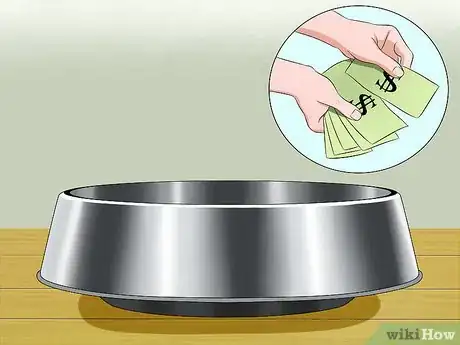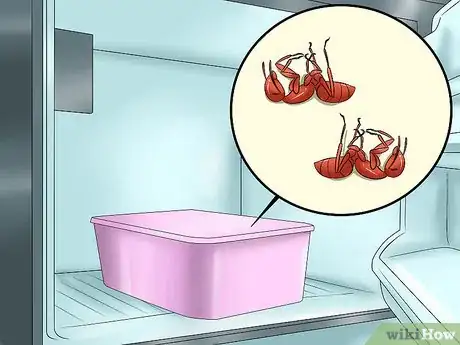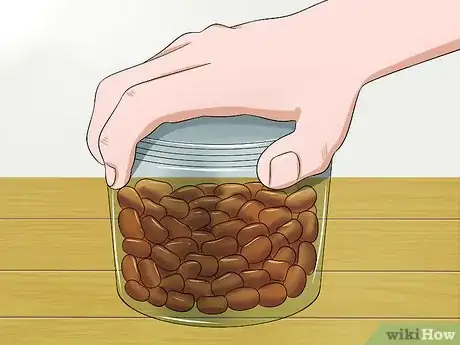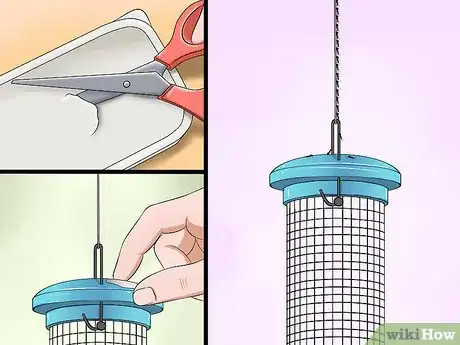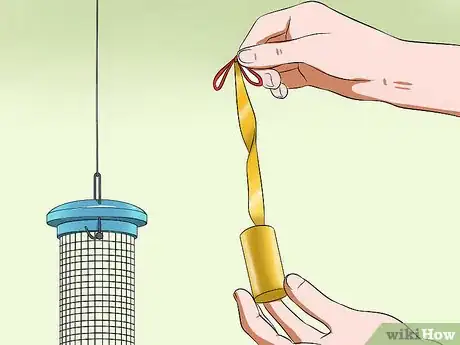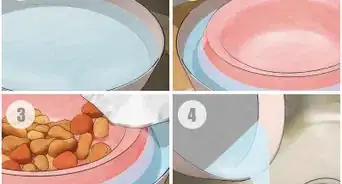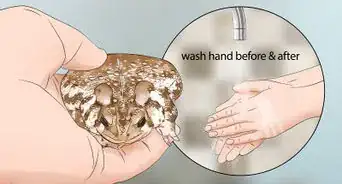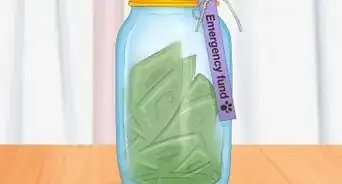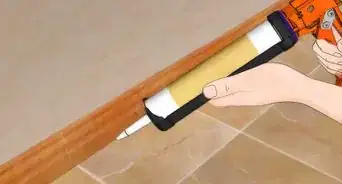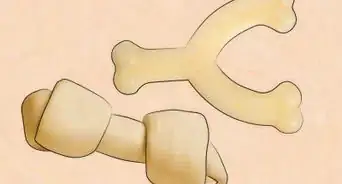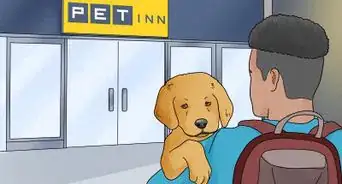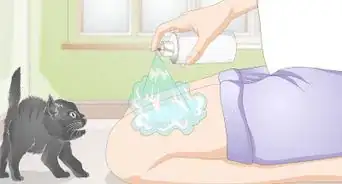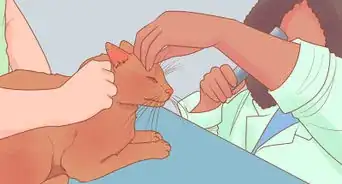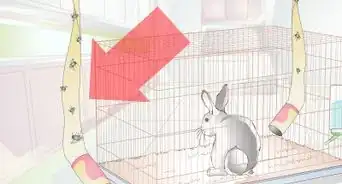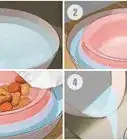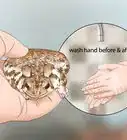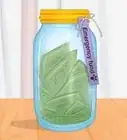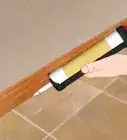This article was co-authored by Luke Lewis. Luke Lewis is a Pest Management Expert and the Founder and President of Native Pest Management. Luke has led his company for over 7 years and specializes in pet-friendly and eco-friendly pest control, termite control, and lawn care. Native Pest Management was named as one of Inc. Magazine’s 5000 fastest growing companies in America. Luke holds both BS and MS degrees from the University of Florida and is a graduate of UF's Pest Management University.
There are 8 references cited in this article, which can be found at the bottom of the page.
wikiHow marks an article as reader-approved once it receives enough positive feedback. In this case, several readers have written to tell us that this article was helpful to them, earning it our reader-approved status.
This article has been viewed 309,323 times.
When ants invade your pet's food, the pet may refuse to eat. When ants invade food stored inside, you might end up with a pest problem inside your home. These instructions will help you ant-proof your pet's food, helping prevent such infestations. In addition to helping keep ants out of your pet's food, moreover, you may be worried that ants will end up in food you put out for wildlife around your home. These instructions also include steps to keeping ants out of these foods. The key is to create a chemical barrier that ants will not cross and which will not be harmful to pets, wild birds, or any other animals you wish to feed.
Steps
Storing and Protecting Pet Food
-
1Store extra food in sealed containers.[1] Coffee cans, Tupperware, and resealable zipper storage bags are some examples of containers that will help keep ants out. You may find that an additional container inside of another will be an even more effective barrier. Food stored in a resealable zipper storage bag and placed inside an airtight container provides a strong barrier against ants.[2]
-
2Create a moat barrier. Set clean food dishes in a pan of water, not too deep (such as a cake pan). The pan of water will act as a moat and keep the ants out. Another solution is to use two stainless pet food dishes, one slightly larger than the other—use industrial strength glue to attach a small piece of brick or very flat stone to the underside of the smaller dish, wait for the glue to dry, and put water in the larger dish. Place the smaller dish with attached brick or stone into the larger dish of water. The water serves as a moat, keeping ants out of the food, and the brick or stone helps keep the food dish from tipping over while raising it well above the water level.[3]
- Set the dish with moat in a different area for two days or more. The ants will eventually stop returning to the normal feeding place.
Advertisement -
3Purchase ant-proof pet food dishes. Several pet food dishes are available for purchase that are purported to protect against ant infiltration. Some of these dishes are meant for indoors, and some have even been developed for outdoor use. Choose the dish that will work best for your pet, whether an indoor or outdoor pet, a dog, cat, or other pet.
- Some standalone moats are also available into which you can place your existing food dish, thereby protecting the food from ants.
-
4Keep the area around food dishes clean. Keep pet food dishes on a removable surface—such as a placemat—and remove to clean after meals. Ants follow a pheromone trail given off as they walk to direct them back to food sources. Cleaning the surface on which the food dish sits—and the dish itself—with soap and water disrupts the pheromone trail, thus discouraging ants from returning.
- You can keep ants away from pet food by only keeping pet food out during designated meal times.
-
5Use peppermint oil. Mix a ratio of one tablespoon of 100% peppermint oil to one cup of water and mix in a spray bottle. Spray near the HVAC return vents in your home to deter pests. Their sense of smell will be disrupted, which is what deters them after the use of peppermint oil. Another effective way of using peppermint oil to deter ants from pet food is to use drops of the oil on a cotton ball to wipe onto baseboards and other surfaces near where ants may enter the home. You might also wipe the oil onto the surface around the area where pet food is stored or around the food dish.[4]
Getting Rid of Ants in Pet Food
-
1Freeze infested food. If ants are already in a food dish, cover the dish tightly and place in the freezer. Leave the food in the freezer until the it is frozen and the ants are dead. This will allow you to remove the ants from the food while salvaging it for feeding to your pet.
-
2Take the dry food out of the freezer. By now the ants should be dead. Pour the dry food into a strainer, over a sink, and shake back and forth vigorously until no more dead ants come out. This will keep from wasting the pet food, as you can now re-serve it.
-
3Re-store pet food. After pet food is free of ants, pour the food into an airtight container to protect against further infestation.[5] Using techniques listed in method one, try to prevent infestation from recurring. You may have to repeat some steps to completely remove ants, so keep trying if you don't succeed the first time.
Keeping Ants Out of Your Bird Feeder
-
1Use petroleum jelly.[6] To protect a feeder that sticks to the window, cut a large circle or heart shape out of newspaper. Tape that inside your window for a pattern. Then, use your finger to draw a Vaseline barrier on the outside of the window. Place the feeder in the center. This method is best used in a cool, shady area. In warm weather the Vaseline will start to run/ drip.
-
2Make a petroleum jelly barrier for a hanging feeder. For a hanging feeder, cut a hole in the center of a lid to a tub of margarine or other small, lightweight object and string the hanging cord of the feeder through the hole. Make a knot in the cord, if necessary, to hold the lid in place. Smear petroleum jelly on the lid or other object. The ants may get to the lid, but they will not make it to the feeder, and other ants will not make the attempt.[7]
-
3Use flypaper. Wrap a band of ribbon flypaper on the feeder pole, or place on window or custom mounts. Flypaper has glue on both sides, so ants will not cross the paper. Keep the fly paper away from the feeder so that birds do not make contact. If flypaper comes off in high heat, hold it up with small pieces of duct tape that have no smooth surface exposed for ants to crawl on.[8]
Expert Q&A
-
QuestionHow do you keep ants out of a dog food bowl?
 Luke LewisLuke Lewis is a Pest Management Expert and the Founder and President of Native Pest Management. Luke has led his company for over 7 years and specializes in pet-friendly and eco-friendly pest control, termite control, and lawn care. Native Pest Management was named as one of Inc. Magazine’s 5000 fastest growing companies in America. Luke holds both BS and MS degrees from the University of Florida and is a graduate of UF's Pest Management University.
Luke LewisLuke Lewis is a Pest Management Expert and the Founder and President of Native Pest Management. Luke has led his company for over 7 years and specializes in pet-friendly and eco-friendly pest control, termite control, and lawn care. Native Pest Management was named as one of Inc. Magazine’s 5000 fastest growing companies in America. Luke holds both BS and MS degrees from the University of Florida and is a graduate of UF's Pest Management University.
Pest Management Expert You should also keep pet food inside where there are less ants around. Also, consider using granular ant bait along the exterior foundation of your home and in nearby landscape plant beds in order to eliminate nearby ant colonies.
You should also keep pet food inside where there are less ants around. Also, consider using granular ant bait along the exterior foundation of your home and in nearby landscape plant beds in order to eliminate nearby ant colonies.
Warnings
- Don't get ant spray into pet food.⧼thumbs_response⧽
- Whenever using insecticides, be sure to follow manufacturer's directions.⧼thumbs_response⧽
- As with all chemicals, keep out of children's reach.⧼thumbs_response⧽
References
- ↑ http://www.howtodothings.com/pets-animals/how-to-keep-ants-out-of-pet-food-storage-containers
- ↑ http://www.dogfoodscoop.com/pet-food-storage.html
- ↑ http://www.howtogetrid.org/pest-control/how-to-get-rid-of-ants-from-your-pets-food/
- ↑ http://www.mommypotamus.com/7-ways-get-rid-ants-naturally/
- ↑ http://www.petfoodexpress.com/resources/find-a-pet/detail/ants/
- ↑ http://pest.tips.net/T003478_Keep_Ants_Away_with_Petroleum_Jelly.html
- ↑ http://www.thriftyfun.com/tf548947.tip.html
- ↑ https://www.ufask.com/how-to-keep-ants-out-of-pet-food.html
About This Article
To prevent ants from getting into your pets’ food, store the food in sealed containers, such as plastic bins with lids or sealed zipper-top storage bags. When you’re ready to feed your pet, try setting their dish in the middle of a shallow pan of water, which will act like a moat and prevent ants from getting into the dish. You can also buy ant-proof food dishes for either indoor or outdoor use. Clean your pet’s food dishes and the area around them frequently, since ants are attracted to spilled food and food odors. Regular cleaning will also destroy scent trails that the ants have left behind during previous visits to the feeding area. You can also try wiping down the baseboards around your pet’s eating area with a few drops of peppermint oil on a cotton swab, since the smell will confuse ants without harming your pet. For information from our Veterinary reviewer on how to use petroleum jelly to keep ants out of your bird feeder, read on!


